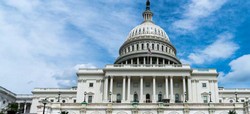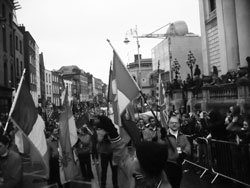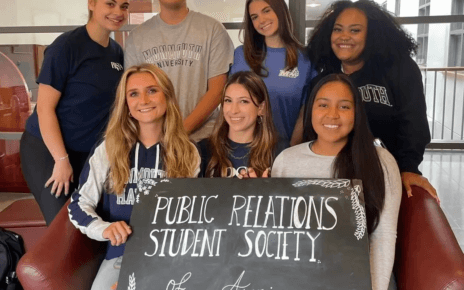A panel discussion titled “Policing in Communities of Color,” which discussed police violence and police reform, was held on Wednesday, Feb. 10. The event was led by Marie Mele Thomas, Ph.D., Assistant Professor in the Department of Criminal Justice. It was also co-sponsored by the University’s Intercultural Center, School of Humanities and Social Sciences’ Sociology Program and Helen Bennett McMurray Endowment for Social Ethics.
The panel featured Sean K. Wilson, Ph.D., an Assistant Professor in the Sociology and Criminal Justice Department at William Paterson University, Andrea McChristian, Esq., Law and Policy Director at the New Jersey Institute for Social Justice, Lorenzo M. Boyd, Ph.D., Vice President for Diversity & Inclusion at the University of New Haven, and Jason Williams, Ph.D., an Assistant Professor of Justice Studies at Montclair State University.
“We’re at an important point-in-time in our history when it comes to racial Justice in America,” Wilson said. “Over the summer, we witnessed many protests throughout the nation that addressed police brutality and inequality in the criminal justice system. What was most surprising was the diversity among these protests.”
Wilson attended several summer protests in suburban settings, noticing many people from different walks of life, he explained. “People were beginning to finally see how harmful, destructive and racist the criminal legal system in America is and has been through our history.”
It is important for the public consciousness on these issues to be raised in order to ensure long-lasting systemic change, Wilson said. “We need the public support, and we need everybody to see this issue as not just a black or brown issue, but rather an American issue.”
Policing in New Jersey has recently seen some policy shift, as a new use-of-force policy has been implemented.
“The use-of-force policy is trying to change how policing occurs in New Jersey, providing citizens with safe policing, ethical, constitutional policing, and policing that involves asking the community what they want and need when it comes to public safety,” Wilson said. “That’s something that has been missing in the past, so it’s extremely important that we foreground the lived experiences and voices of the oppressed and marginalized in policy conversations.”
2020 saw a dual pandemic between the COVID- public health crisis disproportionately impacting black and brown communities living in crowded housing with no access to quality healthcare, and a pandemic of racial reckoning, McChristian said.
“These crushing pandemics of racism and public health issues have really exposed the structural racial inequities that have been in America for many generations that we didn’t clearly want to face,” McChristian said. “That’s why I think we’re really at a critical moment.”
McChristian questioned if we are at a moment of making reparative policies and structures for helping black and brown communities become whole again, or if we will turn to platitudes such as hashtags, extra holidays and diversity training.
“These are all nice and great, but are these reparative systems the well-funded investment we need to make sure that we all have access to healthcare across communities,” McChristian asked. “That we have access to good schools? Or that we don’t have the highest racial disparities in youth and adult incarceration in the nation. If we’re not willing to actually put the money behind reparative systems and structures, I feel that this will be a wasted moment. But to Dr. Wilson’s point, I’m hopeful that with this energy and this power, especially with this New Jersey budget season coming up, that we can begin to make these reparative systems to make communities whole.”
Boyd spent nearly 15 years in law enforcement, the last 20 committed to training the police.
“Dr. Wilson and Dr. Williams and I have talked for years about the frustration that I have in doing the job, but unfortunately the line of demarcation right now in this country was the murder of George Floyd,” Boyd said. “We saw this murder in real time for nearly nine minutes. Everybody that was pro-policing started to take a step back and realize there are issues in policing.”
It is not enough to simply include more people of color in policing to solve the issue, Boyd explained.
“Not only do we have to reimagine policing, we need to reimagine training,” Boyd said. “We have to fix the broken system of policing and that’s the path forward, but now we start to see the levels of accountability. Up until now we spent a lot of time talking about white fragility, but the point that I’m making now is we need to start looking at blue fragility. When police officers think that they are under attack, what is actually happening is they’re just being held accountable.”
The night’s discussion must also be compounded with the insurrection on the nation’s Capitol building, Williams said. “With that event, we see the sort of intersection of policing and whiteness. The wanton failure of police and white terror as well as police violence. We also see state sanctioned white supremacy on display as well.”
Then-President Trump, egging on his supporters to engage in the insurrection forces us to contend with the real life threat of white violence within a vigilante context, Williams said.
“We must not also forget about the white violence and terror we see in the institution of police in itself. There were reports about police officers being involved in [the insurrection]. To me, that’s changed tremendously the sort of mandate that needs to happen with this institution. What needs to be done with this institution that so heavily governs our freedoms and liberties. We just simply can’t take this lightly.”
IMAGE TAKEN from Pexels.com




